Bordier & Cie was founded as a limited partnership in Geneva, in 1844. For five generations it has been owned and managed by the same family and moreover employs several family members. Today, with its 270-strong workforce, the Bank independently serves private clients and their families.
Bordier: a family business run by the fifth generation
Bordier is a family business. But is that how its clients see it?
Grégoire Bordier (GB): Yes, I definitely think so. Especially since, in my view, “family business” is a concept that runs far deeper than this basic definition. In addition to full or majority ownership by a family, transmission from generation to generation and the family’s presence among senior management, what sets this type of business apart is seen in much broader terms by clients. What I think gives a business a family feel is, first and foremost, its mindset, its DNA and the values it stands for. Companies that are family-owned tend to be imbued with a sense of stability and connectedness. On the other hand, the more family members who have an ownership interest, the more the family ethos and its impact on the business are diluted, and relationships may get more complicated.
Let’s talk about how you are organised. What makes Bordier unique?
GB: Bordier is not your standard family business. It has adopted a partnershipbased corporate structure. In terms of our legal structure, we are a partnership limited by shares, with ownership units held in turn by a partnership. That’s rare in Switzerland. Domestically, there are now just a select group of private bankers left with this corporate structure. Besides Bordier & Cie, there’s Baumann & Cie, E. Gutzwiller & Cie, Rahn+Bodmer Co. and Reichmuth & Co. In essence, it means the partners of these banks have unlimited liability and thus they are responsible for and involved in everything their bank does. In my view, that represents a major source of competitive advantage. Every one of our clients can rely on us managing their assets with the same care as we take with our own. That brings our respective interests into perfect alignment. When shareholders’ interests are put before or run counter to those of clients, it’s harder to do that.
“What I think gives a business a family feel is, first and foremost, its mindset, its DNA and the values it stands for.”
How does the “family business” label help you to stand out in an environment as competitive as wealth management?
GB: For those who do not really like change and are looking instead for stability and predictability, working with a family-owned bank is clearly a source of additional security, with the responsibility factor playing a key role in this. We should also add the connectedness factor: the close ties between management and employees, between employees, between wealth managers, between the family and clients. This is something that people really like when they deal with us. Thanks to these close relationships, we are able to act more nimbly and respond more rapidly, especially when making decisions. When you do business with a family firm, you can really feel the connection with the company’s DNA, I think. The combined sense of stability, longevity and longterm vision you get is also reassuring and makes a real difference. And what applies to our clients applies equally to our employees. Under our long-term strategy, no one contributing to our success need worry unduly about such things as a structural reorganisation, an acquisition, sudden management changes or the arrival of a new owner who will introduce new rules and turn the corporate culture upside down. These are strengths that can also be seen in companies with a similar structure to ours, irrespective of their size. Firmenich, Bongénie and Manor are family-owned companies that come to mind here.
What values does the family want the business to stand for?
GB: I don’t think you can separate the values of the family from those of the business. They are part of the same continuum underpinning everything we do. First and foremost, they include acting responsibly and independently, as well as building for the long term and always being there for our clients. There are other principles we hold dear and apply on a daily basis in our banking activities at every tier of the business. Here I’m referring to our code of ethics, our professional approach, our emphasis on capital protection and our high level of customer service. These principles are firmly anchored in our daily activities
Grégoire Bordier, Partner
How did you join the family business?
GB: Being born into a family that’s the custodian of a family business obviously had a bearing on this. At a certain point, members of its younger generation inevitably face the question of whether to join the firm, while its older generation have to deal with succession issues. But no one has their arm twisted into a career in finance. It’s a personal decision. At present, there are several of us working at the firm. There’s my brother Evrard, a Partner like me, and my cousin Camille Bordier, who is a management assistant. Personally, the idea of a career in finance appealed to me at a young age, but I wanted to learn my trade away from the family business to prove my mettle and gain experience. That’s why I spent the early days of my career working for various investment banks. I joined Bordier in 1997.
Did you join as Partner?
GB: I was named Partner in 1998, so very soon after I had joined the Bank. That may seem very or even too fast. Even so, what may have looked unduly rapid or premature ultimately worked out very well for the Bank. If you are promoted rapidly or at a very young age to running a business, you are able to bring real freshness and energy. And that’s a distinct advantage. Besides, I had gained considerable investment banking experience, and that has proven beneficial for the firm. Another contributing factor was the decision by my father’s cousin, Philippe Bordier, to bow out. He wanted to retire, and a family member was needed to replace him as Partner. I was the only one willing to take over the baton at that particular time. Had that succession-related issue not arisen, there’s no doubt I would have been made Partner later on.
What does becoming Partner mean for you?
GB: Over the course of time, things have changed tremendously in familyowned banks from a succession point of view. Today, you are no longer born a Partner; you have to become a Partner. I’m increasingly certain that’s the case. Having the right name helps, but it’s not enough on its own (laughter). You also need to prove your leadership capabilities and skills. Like many of my peers, I’ve had to show that I was up to the task. I needed to set an example, bring real energy and share my vision. And as in any organisation where the performance of the whole reflects the work done by each individual, it’s also crucial to be able to maintain teams’ motivation and engagement at a high level. Obviously, that comes from results but also reflects the trust that you inspire. Knowing where you are heading is very important in our situation. Especially when several Partners have a hand on the firm’s tiller. For example, if teams do not believe in the leadership abilities of one Partner, they will naturally seek the backing of another they regard as more competent. That can give rise to a sense of insecurity and ultimately major imbalances.
“Someone from outside the family is bound to have a different perspective, both in how they see the world, view the business environment and consider the competition. But these differences represent a source of strength.”
How did you manage to establish your credentials as a Partner, especially vis-à-vis those people who are not part of the family?
GB: In my case, it was a multi-stage process. The existing Partners gave me tremendous support. To begin with, my dedication to work stood me in good stead, as did my business development and innovation capabilities. Since these two factors are quantifiable, those around me soon took notice. After that, I managed to win people over by developing an increasingly firm-wide vision.
Another factor is that being able to make decisions – and to do so rapidly – is a crucial quality if you want people to support and get behind you. A leader who fails to make decisions can rapidly go down in people’s estimations.
Being able to listen is another key factor. Striking the right balance in relationships between all those involved is also a tough challenge, but you get better at it with time. So having Partners with different management styles is an advantage because each one will connect differently with each employee.
The family business as a model
Some of your Partners are not family members. In your opinion, does whether or not you belong to the family implicitly alter your view of and objectives for the firm’s development?
GB: Someone from outside the family is bound to have a different perspective, both in how they see the world, view the business environment and consider the competition. But these differences represent a source of strength. They clearly advantage a family business’ leadership team. The external perspective, whatever it may be, can open minds, expand horizons and enrich points of view. And in a business like ours, the family culture is a strong one and is embraced by all the employees, as well as by the Partners who come in from outside. Figures such as Pierre Poncet, a Partner from 1992 to 2012, have played a major role in the firm’s development. And he embraced the family values that we stand for with exactly the same energy. The only problem that I can foresee in this type of situation is keeping the external drive in harmony with the firm’s core values. If you can get this combination right, objectives align themselves.
Is transmission as important an issue for a Partner who is not from the core family group?
GB: To answer this question, I think we need to go back to basics and the partnership agreement that unites us. In any company, the more owners it has, the greater the extent to which their ties to the business are diluted. And the external Partners’ vision can more easily become short-termist. Here, there are fewer of us, and each Partner theoretically owns 100% of the firm. That means we need to act from a longterm perspective. The care taken in putting the firm on a sustainable footing thus directly affects how we run it, as this impacts the capital it invests. And transmission is a natural part of the same process. There is also a more emotional aspect connected with transmission, which affects all the Partners equally: the pride that comes from seeing the business thrive and prosper after they move on. Seeking to maximise profitability makes no sense from this perspective because it could weaken the firm’s foundations. While we are the owners of our Bank, we are really only custodians. It’s up to the Partners, be they from the family or elsewhere, to hand it down to the next generation. Anyone not sharing this vision would not be a good fit for the leadership of our Bank, family member or otherwise.
How deep does the “family” concept run through the business?
GB: “Family” is not a concept that’s defined in precise terms at Bordier, and I see it in very broad terms. I consider that both very distant cousins and more direct members belong to the family. Whether a new Partner is a close or distant family member does not create any structural problems, at executive level at least. Our clients and employees do not have any trenchant views on the issue, it seems to me. Provided that the family retains an interest, it’s keeping up its side of the bargain. Even so, it’s vital for there to be at least one family member among the Partners. Were there not to be any, that would alter the equation because it would be hard to support the claim of being “family-owned”. This factor aside, name or family connection is irrelevant, regardless of how strong their claim is. What counts is what the individual can bring to the firm. Nowadays, an individual’s skills and capabilities can make all the difference.
What structural limitations and risk factors are there for family-owned businesses?
GB: Some argue they are less innovative or possess less appeal. These are clichés we need to try to dispel. Family businesses that move more slowly may be seen as being a less appealing prospect for people who are more attracted to companies active in new technologies, but that’s not actually true. Recent studies have proven the opposite is in fact the case. And there are some highly innovative family-owned businesses. Caran d’Arche, Victorinox, Firmenich, among many others, come to mind. What’s more, anticipating change is clearly part of the mindset of familyowned businesses. It underpins their long-term vision, as well as their drive to achieve stability and sustainability. And while a family business may in theory take less risk than a publicly-held or non-family-owned company, that does not mean that its decisions are any less innovative or its investments are any less timely. It simply means its risk factors are managed more prudently.
“What’s more, anticipating change is clearly part of the mindset of family-owned businesses. It underpins their long-term vision, as well as their drive to achieve stability and sustainability.”
And while this degree of caution can create the perception that family-owned businesses are less responsive and spontaneous, this can be largely dispelled by the fact that it’s easier in this type of organisation to reach a consensus rapidly. So what if we are less competitive in certain arenas! Our long-term view tends to cut out mistakes over time because we are not endlessly seeking to reinvent ourselves.
How can we help to avoid the conflicts and disputes – often seen as inevitable – between family members over a family business?
GB: It’s hard for me to talk about other situations, but as far as our family is concerned, it’s vital for two principles to be upheld between Partners bearing the family name. Fairness in financial affairs is number one. Everyone should be treated in exactly the same way. Secondly, it’s about clearly marking out areas of responsibility to make sure we do not step on other people’s toes. If we do that, inter-family relationships are bound to be far more harmonious. And should family members have shared responsibility for certain issues, a third party always takes part in the discussions to act as a mediator and restore the balance or adjudicate, if necessary.
Structure and governance of the family-owned business
In July 2020, the Swiss entity was restructured, moving from a limited partnership to a partnership limited by shares. What changes did this entail for the family governance framework?
GB: This change did not have the slightest impact on the family governance framework. Our objective has remained exactly the same: keep running our business in a manner that’s perfectly aligned with our clients’ interests. That said, we have modernised our corporate structure to achieve a better fit with today’s environment. This adjustment did not change anything as regards our commitments. Our partnership contracts did not require the slightest change. The only real change involved a tweak of the corporate governance framework, as we had to set up an external control body. Partnership contracts are essential and have proven their worth because it’s crucial to lay down the arrangements for Partners to join and exit in order to safeguard the future of the business. Beyond these considerations, the partnership contract naturally helps to settle issues related to each Partner’s ownership interest and their relationship with the others in this regard.
Have you ever considered drawing up a family charter?
GB: I understand perfectly how that may be useful for certain types of family business, but for ours, it would not add anything that we don’t already have. What’s more, the partnership contract that lays down our relationships is very business-oriented, whereas a family charter has a more intellectual focus. I don’t think it would be a good idea to mix up both these aspects because it could breed confusion in relations between the Partners. And things are sufficiently clear within our partnership contract.
And what about for Partners from outside the family? Are their interests limited in order to retain family control or are you open to them taking a larger stake?
GB: Until now, family members have always held a majority interest. That said, it’s not impossible that the balance may shift the other way, for example if there were to be a link-up with another family, as with Pictet, where the Demole and de Saussure families have long held the reins as well.
Succession arrangements andgenerational change in a family business
One of the major priorities for a family business is passing the baton to the next generation. Can you tell us about your experience?
GB: When I took over from Philippe Bordier, my father’s cousin, at the helm of the Bank, the transition period was a short one, and that proved beneficial. Employees may feel that things tend to drift during a handover, and so it’s important to work hard keeping things as stable as possible. Having two generations perform the same responsibilities for too long can create tensions within families, and so it’s important to keep that type of situation from dragging on. The handover should also be regarded as an opportunity – the perfect time to inject fresh impetus.
“Things have moved on considerably. We no longer need to prepare our successors because they get themselves ready. Firstly, by showing their desire to work hard and join the firm and secondly, by showing what they can do.”
Thinking about when it’s time for you to pass the baton, what would you like to hand on to the next generation? Do any particular values, a brand or expertise spring to mind?
GB: First and foremost, I would like to pass on an efficient operation – a robust bank that’s ideally suited to the challenges that lie ahead. As Partners, we are not just owners, but also custodians. And we need to pass the firm on to the next generation, not just in good shape but also preserving the family values, ethos and DNA – all the intangibles that make it unique. It’s then up to the future Partners to take the Bank forward, moving with the times and passing it on to the next generation when their time comes to bow out
How can you prepare the next generation to take over a family business?
GB: Things have moved on considerably. We no longer need to prepare our successors because they get themselves ready. Firstly, by showing their desire to work hard and join the firm and secondly, by showing what they can do. Naturally, we monitor their progress, support and advise them, but it’s important for them to take control of their own destiny, so they can acquire the requisite skills to convince existing Partners of the legitimacy of their ambitions and achieve the goals they have set themselves. The goal is not to prepare the next generation, but to pick the right people. And I firmly believe they will be even more effective managers if they have been trained in advance at first-class institutions in a variety of complementary and innovative areas. In our current environment, it’s crucial to develop your skills. Because, generally speaking, employees’ skill sets have expanded tremendously. A future business manager must be able to pass muster. Even though being part of the family gives you a significant advantage, that’s not enough on its own. And it will not suffice unless the next generation lives up to the demands of the role entrusted to it
What can one do to make a handover go smoothly?
GB: First of all, there are several pitfalls to avoid, such as insufficient preparation by the successors, no credible candidates to pass the baton to and the inability of the new arrivals to provide the innovation and added value expected of them. We should also consider experience: someone with a great deal of experience will tend to be less flexible and put up stronger resistance to innovation. It may thus make sense to bring in someone younger to the family management team when it already includes a number of members who have been on board for several years. The newcomers must have the requisite maturity, however. That goes without saying. Either way, if there is one rule of family governance that needs to be met, then it’s maintaining a balance: a balance of skills, experience and ages. Finding someone with the right profile and bringing them in at the right time will also help make the changing-of-theguard a smooth process.
Read also:
- Switzerland
- 06/07/2022
- Switzerland
- 06/07/2022
Bordier & Cie in figures
- 1844 Bordier & Cie founded as a limited partnership in Geneva.
- 5th generation of the Bordier family presiding over the Bank.
- 3 unlimited partners: Grégoire Bordier, Evrard Bordier and Christian Skaanild.
- #1 Swiss private bankers.
- 270 employees Group wide, on 3 continents, in 6 countries and in 11 cities worldwide.




